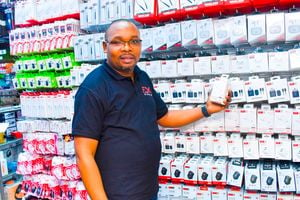
Anthony Kahinga of Elimutab in his Westlands offices in Nairobi on November 20, 2024.
Mr Anthony Kahinga and Grace Wairimu, co-founders of ElimuTab, harbour a deep commitment to transforming education in Africa through technology.
Kahinga’s entrepreneurial journey was driven by his recognition of the major gaps in digital literacy and access to quality education in Kenya.
“My passion for entrepreneurship grew during my university years when a friend invested in a technology accessories venture. This allowed me to travel to Dubai and China, where I saw first-hand how technology can transform communities. I have always wanted to create African solutions for African problems,” he says.
The duo identified an urgent need: Africa has the world’s youngest population, with a median age of 19.7. However, the continent faces a huge digital skills gap.
Seizing an opportunity, he began selling educational tablets designed to address gadget addiction while offering academic content and entertainment. This eventually led to the founding of ElimuTab, an EdTech company with a vision to revolutionise education in Africa by integrating digital technology and STEM tools into classrooms.
“Our mission extends beyond schools. We aim to empower parents to become active participants in their children’s learning while equipping kids with digital literacy and 21st-century skills to prepare them for the future of work, entrepreneurship, and global competitiveness,” says Kahiga.
The company provides educational tablets designed to bridge the digital divide, particularly in Kenya and beyond.
Through his device-servicing business, Kahinga became aware of the challenges parents faced. Many returned for additional tablets for their other children while others referred friends to the business.
The increasing demand exposed the potential of using technology as a tool for education and managing children's screen time.
While servicing school computer labs, Kahinga found some lacked educational content. After collaborating with local EdTech providers, they integrated the content, leading to increased demand through positive referrals.
“A new challenge arose when parents who had purchased tablets began returning for repairs, only to discover that parts were unavailable. Suppliers struggled to provide replacements, making it difficult to resolve issues,” he says.
This limitation prompted the idea of creating ElimuTab, their brand. This would give them direct access to parts, control over product quality, and the ability to integrate local educational content seamlessly.
With an initial capital of Sh700,000 from his savings, and in collaboration with the Kenya Institute of Curriculum Development (KICD) approved local digital content providers, and publishers, Kahinga and his team launched ElimuTab, with content tailored specifically for Kenyan students.
Focus was on investing in research and development, engaging with digital content providers and publishers, and sourcing packaging locally. The team also invested in building a skilled technical team, importing tablet components, and integrating the content, parental controls, and hardware to create a comprehensive and effective learning tool.
“The tablets feature parental controls through ElimuSafe, ensuring a safe and engaging learning environment. Designed for learners aged two to 17, from preschool to high school, ElimuTab offers peace of mind for parents, a valuable digital tool for teachers, and a transformative solution for education,” says Kahinga.
ElimuTab has a team of 30 professionals, including staff for after-sales support, technical integration, sales, and experts in coding, robotics, and digital literacy. The team also handles app activation and content management to ensure efficient operations.
“We offer tablets in three sizes: 7”, 8”, and 10”, with age-appropriate content and features. Prices range from Sh8,000 to Sh19,000, and most content is activated for free upon purchase. The tablets offer online and offline access, with some advanced content requiring a subscription after the first year,” he says.
ElimuTab has impacted over 30,000 students and trained more than 2,000 teachers and 1,000 school owners and directors in digital literacy, coding, robotics, and technology integration.
There is a big gap in affordable and locally relevant educational technology. Many schools struggle to integrate tech into learning, limiting students' digital literacy and global competitiveness.
ElimuTab was created to fill this gap by offering an affordable, curriculum-aligned tablet, equipped with interactive content and parental controls. This localised digital solution enhances learning outcomes and prepares students for the future.
The ElimuTab tablet offers over 1,000 books, including storybooks, course books, and interactive materials, along with coding, foreign languages, STEM content, and educational games. Preloaded with age-appropriate content and supporting user profiles, it is ideal for home and school use.
It also provides interactive screens for teachers, enhancing lesson delivery with virtual labs, interactive content, and engaging presentations, improving learning outcomes and promoting classroom engagement.
Its coding and robotics programmes provide hands-on learning, encouraging problem-solving and creative thinking. The company promotes STEM education through local projects, hackathons, and university partnerships, preparing students for a future in technology and innovation.
The government had introduced about a million tablets in public schools, with private schools following suit to embrace digital learning in schools.
“We see this as a positive shift toward transforming education in Kenya. With the ongoing changes in the Competency-Based Curriculum (CBC), ElimuTab aims to guide school owners, teachers, and students through the integration of technology, says Kahiga.
The firm has partnered with local publishers and content providers, including children’s entertainment organisations, to deliver high-quality educational content. The company operates a licensing model that shares revenue from user activations with partners.
ElimuTab’s platform provides a wide array of digital books from grades 1 to 12, including storybooks. Preloaded on tablets, these digital books are affordable, reduce printing costs, and support environmental sustainability, with automatic updates that eliminate the need for costly textbook replacements.
Although some publishers are hesitant about the digital shift, ElimuTab ensures authors and publishers are protected through digital rights management (DRM) software, ensuring fair compensation.
Kahiga recognises challenges such as limited digital literacy among teachers and technology integration in classrooms. To overcome these, they provide teacher training, form partnerships with banks for financing, and offer customised content for different education systems.
He recognises challenges such as limited digital literacy among teachers and financial constraints, especially for schools and learners in rural and underprivileged areas. To address these, they provide teacher training, form partnerships with banks to offer financing solutions and deliver customised content for different education systems
ElimuTab plans to expand beyond Kenya, focusing on eastern and southern Africa, before targeting the global markets.
“We aim to transform Africa's education system by localising content for each country, with a focus on books as primary learning tools. Our goal is to address gaps in access, digital literacy, and quality education by integrating interactive, curriculum-utter-aligned content, STEM education, and teacher training,” he says.
The company balances social impact and profitability by offering affordable solutions, continuous innovation, and flexible pricing. ElimuTab targets reaching one million learners and installing STEM labs in 500 schools.











